- Home
- Deborah Smith
On Bear Mountain Page 10
On Bear Mountain Read online
Page 10
Daddy said it didn’t matter, that there was room for all kinds of creations in the world. I stared at Daddy with vengeful misery. I wanted to yell, You ought to care. It’s your fault, but the words remained inside me, festering. I loved Daddy so much that the fury and the disappointment had no place to go but into the bones of my own soul, where they would harden and constrict.
At school, the double horror of the truth sank in again. Janine sidled up to me one day and whispered, “You better be nice to me or I’ll tell my daddy to have your mama dug up, because you’re just a charity case and my daddy had to pay for her funeral.” I immediately said, “You’re a liar,” but she repeated it smugly and I stared at her in blind rage, knowing in my guts that even Janine Tiber wouldn’t lie about something like that. I drew back a fist and punched her in the mouth, regardless. She lost the last of her front baby teeth thanks to me, but she never told anyone I’d hit her, which was even more proof that she hadn’t lied. She wouldn’t risk explaining how I’d been provoked.
I never asked Daddy about the funeral costs. If it was a loan from Mr. John, he paid it back and never told me, but the damage was done. He mourned Mama endlessly, but I punished him by never crying in front of him. He wore her little gold wedding band on a chain around his neck. I slept in her shirts, burrowed in her sweaters, enclosed myself in everything of hers that would fit me in any form. Even then, in those first weeks and months, I was changed. Daddy would begin to sense all that as I grew older, but not yet.
I sneaked after him on clear nights and watched him stand by the Iron Bear with his tear-streaked face raised to white, lonely moons. His grief for Mama surpassed my own, and made it easier, somehow, to learn to hide how much I missed her and faulted him. We couldn’t afford two moongazers in the family. I knew my own strength, now. I saw Daddy’s world — his art, his gentle whimsies — as selfish and short-sighted. After all, it was me who had rescued Arthur, and saved his life.
After Daddy stumbled back inside the house on those nights, I crept to the Bear. I always found a small tree limb to bring with me. With all my might I flailed at the sculpture’s unbreakable prongs and swoops and angles, furious because the heartbreak of lost magic and betrayed trust made not even one dent, not even one shiver of sympathy from the one creation that had the power to steal everything I loved. Liar, killer, thief, I chanted. Hard and fast rules began to take root where fantasies had played. I would escape from this kingdom ruled by forces I couldn’t control. And then I’d become just as unbreakable as the uncaring thing I tried to tear apart.
PART
TWO
TWENTY-TWO YEARS LATER
CHAPTER 7
Angele kept a scrapbook of her son’s accomplishments, though she didn’t tell him. Pasted in that volume was an article she’d found in a veterans’ magazine. The writer had interviewed a soldier who’d served with Quentin in the 1991 Gulf War.
The captain in our Ranger company was a career officer named Riconni, but we nicknamed him X-Ray because he had a weird ability to see inside things. This captain could take things apart, fix ’em, and put ’em back together like new. He didn’t even need a diagram or anything. Guns, cannons, hell, probably even a whole tank if you asked him — there musta been nothing Capt. Riconni couldn’t memorize and take apart.
He came from a tough neighborhood somewhere around New York, I heard — he had that whole mean-street attitude going when he needed it, but he was real sophisticated and educated, too. He had this look in his eyes that told you he’d seen something he couldn’t put back together or forget, so maybe that’s why he’d been in the Army forever. He didn’t have much to go home to. He was easy to get along with, but nobody messed with him. He liked to read poetry and shit like that. He could speak Latin, for godssake.
But he was there when we needed him. When a Humvee drove through an Iraqi minefield we had five guys hurt bad, screaming. Nobody else woulda set a foot around the Humvee. But Capt. Riconni took a long look at the spots where the mines blew up, and then he picked his way out to those guys — five trips out, five trips back, while the rest of us just stood there, staring. Officers usually didn’t risk their own hide.
Capt. Riconni carried all those guys out of the minefield, and he never missed a step. The colonel asked him later how he did it, and Capt. Riconni just said, Everything fits a pattern. All you have to do is find it.
When our company got back to the States the Army gave him a couple of medals, and he got some write-ups in the news. He quit the Army not too long after that. Guess he’d proved whatever he wanted to prove. I’ve always wondered what happened to him since then. That captain was the bravest man I’ve ever seen, but he’d walked some heavy-duty minefields before he ever went to war.
Angele felt heartbroken every time she read that last part, though she never told Quentin how much she worried, how much she still grieved for the words she and he never spoke anymore. He, in return, had never told her he’d saved men’s lives, and had been called a hero.
• • •
The incredible year that ended in blood on a Georgia mountaintop began, for Quentin, in a private viewing room of one of the biggest auction houses of Manhattan. He stood at a discreetly tinted two-way mirror, gazing down on a packed audience of wealthy art patrons with the cool intensity of an amused wolf. He would turn forty on his next birthday, and the slightest hint of gray tinged the hair at his temples. But he was still muscled and lean, a disciplined man of spartan but elegant tastes.
Dressed in a handsome gray winter suit, his black hair gleaming under the soft lights, he might have been one of the wealthy men sitting in the room beyond the window, except for his heavily callused hands, the Army tattoo hidden under his sleeve, and a deep, watchful reserve that spoke of something far less elegant than the suit promised.
The seven years since his return from the military hadn’t been soft or easy, but they had been successful. He owned an architectural salvage company. Dreams of becoming an architect or a builder had long since faded. With blunt precision and a certain compassion for lost treasures, he dismembered other people’s homes.
In the pocket of his fine gray trousers he still carried his father’s gift, the thin silver knife, spring-hinged and razor-sharp. He kept it more for nostalgia than need, though there were still times when he palmed it discreetly behind his curled fingers.
Angele sat nearby, straight-backed and proud as she gazed at the auction beyond the window. A Manhattan stylist kept her graying hair short and perfectly formed. Her face was lined with the soft signatures of sorrow and wisdom.
She had long ago given up her glasses for contact lenses, and her plain skirts had become simple, tailored, suitdresses. She wore no jewelry except tiny gold earrings and the plain gold wedding band Richard had given her. She walked with a handsome wooden cane fitted with a brass handle that Quentin had made for her from metal left in his father’s supplies. Everything else she had made of herself — image and substance — was designed to reflect well on Richard’s sacrifice and his work.
In the art world she was gently known as the Steel Angel, a respectful joke that indicated how much fame she’d earned as a one-woman promoter of her husband’s work. Over the past two decades she’d written countless magazine articles about his pieces, persuaded museums to display his sculptures, organized gallery exhibits, and bombarded the art critics for endorsements.
She had even persuaded a small publisher to issue a handsome book with pictures of the sculptures and excerpts from Richard’s notes. Even now she went regularly to the bookstore at the Museum of Modern Art to check their inventory and secretly, when the clerks weren’t looking, turned the Riconni book face out on the shelves.
Finally, she’d staged an amazing promotional coup. She’d talked her way into a meeting with brawny, mercurial Lucca, the current darling of the Italian fashion designers, and had convinced him to use a few Riconni sculptures as set pieces in one of his smaller Parisian showrooms. Richard’s eroticall
y masculine sculptures fit perfectly in the Lucca-centered world. “What life, what lust, what a consuming need for satisfaction they inspire, so much like my own work,” he said of the Riconnis, when interviewed by Vanity Fair.
Soon Riconni sculptures had been seen in his showrooms across Europe, and then, New York. As one after another of the sculptures sold to high-profile buyers, the art world began to take notice. Suddenly Riconni was the name serious collectors of modern art wanted to possess. An auction was announced. The entire collection of remaining Riconnis would be sold at one of the most talked-about events of recent years.
Today.
“They’re selling the piece your papa titled Absence,” Angele said to Quentin. Another sleek creation rotated into view with slow, grand presentation on a circular platform. The audience’s numbered placards flashed like military signals, and the auctioneer’s elegant chant rose with theatrical excitement.
“I watched him build that,” Quentin said. “One summer.”
A long canine tongue licked Quentin’s hand, distracting him, and he was grateful. He stroked the head of the large, front-heavy, ugly blond dog who then settled back down at his feet, pillowed on the long gray coat Quentin had tossed there without caring. Hammer affectionately licked Quentin’s polished shoes for a moment then returned to gnawing a beef bone the auction house’s staff had hurriedly acquired from a restaurant. No amount of pampering was too extravagant for Richard Riconni’s heirs, including pets.
“Hope and Light, item one fifty-seven, sold,” the auctioneer intoned, slapping a gavel on a gleaming wooden podium. “For two twenty-five.” The sound of the gavel filtered into the small private room through a speaker, which lent it an appropriately surreal quality. Two hundred and twenty-five thousand dollars.
“Why couldn’t your papa live to see this?” Angele asked. “I know he’s with us, watching over us in spirit, but still.”
Quentin inclined his head in acknowledgment but refused to be drawn into his mother’s musings. She wanted to believe Father Aleksandr’s gentle view of suicides. He’d told her Papa was watching from a special place granted by the pope. Religious faith was one of many supports Quentin had removed from his life. He regarded it as a curiosity, not a need.
She grew more rigid at his silence. “Don’t you ever wish your father had lived?”
“I wish Papa knew how much you love him.”
“And you?”
“He was my father. I try not to think about it.”
She looked at him angrily, as if some younger and more easily damaged version of herself were about to escape. On the delicate antique table near Quentin sat a stack of glossy catalogues prepared specially for today’s massive sale. The title was embossed in gold. Richard Riconni: Sculptures from the Industrial Millennium. Angele opened one of the auction catalogues and made herself look at the one page she’d avoided until then.
On it was printed a grainy black-and-white photograph of the bear sculpture. Art critics were calling the sculpture a turning point conception. Beneath the photograph, a single line of text summed up the sculpture’s fate: Unfortunately, this unique early work of Riconni’s was destroyed in 1976. (Owner: Mountain State College, Tiberville, Georgia.)
She touched the page with her hand. “This deserved better than a scrap pile. This is the one that mattered the most to him. And to me.”
Quentin’s cool reserve wavered for a moment and he spoke gently, as he had as a grieving teenager all those years ago. “I’d get it back for you, if I could.”
Suddenly tears slid down her face. She turned away, her back shaking. Since he’d left home as a teen she’d rarely acknowledged his help, his sympathy, or his affection. Quentin searched for tissues, saw none, and ripped two thick blossoms off an arrangement of roses. He handed them to her.
“Roses?” she said. She made a garbled sound over the clumps of satiny red petals, then pressed them to her cheeks. Hammer sat up, anxiously cocking his head at her noises. He rested his huge, friendly head on her lap and gazed at her with worried brown eyes. Quentin had rescued him from a Dumpster. He was perpetually grateful to all Riconnis.
“Item number one fifty-eight, sold! Sold at one-point-one,” the auctioneer’s disembodied voice said. Million.
The last word, unspoken but implied, made a silent echo in the room’s stunned silence. The amounts were beyond comprehension. The bleak irony of it all was beyond words.
• • •
Ursula, you don’t make it easy for a man to be a man. You’re too self-sufficient. You’re a small business with no interest in outside investors. A professor said that to me in graduate school after our third and last date.
He was right. I had grown up determined to make ends meet and to never accept the Powell-anointed middle ground of make-do. No half measures for me, even though some of the reserve people assumed about me simply came from a childhood spent in poverty at Bear Creek. My cool confidence was really just a protective stillness learned from standing downwind of chicken shit.
While I was a student at Emory University I worked sixteen hours a day, seven days a week to buy a tiny old bookstore in an aging Atlanta neighborhood. For the first few years after I graduated I made up for the store’s losses by moonlighting part-time as a night-shift manager at a canning factory in the flat suburbs south of Atlanta. I was driven by a need for security — not money so much as dependable goods and ideas. I scared away the men who might have helped me — challenged them, overwhelmed them, sent them scuttling back down the sides of my personal mountain as fast as they could run.
Good-looking women don’t usually want to be left alone the way you do, one ex-boyfriend said to me as he packed his apartment for a move to Europe.
Smart women are all good looking, I answered.
I liked to think of myself as classic, like a statue of a Roman noblewoman. At the age of thirty-two I had topped out at almost six feet tall, with long hair the color of an old penny, a strong-boned body of reasonably jiggling proportions, and a square-jawed face with deepset blue eyes surrounded by stubby brown lashes.
And I finally had found a pleasant, dependable, likable man to keep time with, as the old mountain women put it. He was a researcher from the Centers for Disease Control. Very brilliant, very logical, very clean. I met him when I rented the garage apartment behind his bungalow. I continued to live there and pay him rent even after several years of intimacy and rejected marriage proposals. He was not happy about that. But I was.
I would never be my mother, I vowed. Never love a man so much I let his dreams kill me. So I’d put distance between the people and memories that hurt me or might hurt me — most of all, Daddy. At least I told myself I had.
I liked to think of myself as happy and right.
But I was all wrong.
• • •
The “Save the Shops of Peachtree Lane” rally, which I organized, was held on a perfect day for public protest: bright, blue-skied, and sixty-five degrees, a sunny vacation in the middle of a chilly Atlanta winter. I carried a clipboard among the crowd with all the humor of a smiling commandant. I looked like the tall, sturdy warden of an elegant female prison, dressed in black silk trousers, a black sweater, and a brown wool blazer, with my hair swept back in a tight French braid. People gulped and did what I told them to do. I handed out SAVE PEACHTREE LANE decals and presented children with silver pencils from the local literacy group. Read, Learn, Grow, they ordered.
The normally quiet, tree-lined, two-lane streets leading into the Peachtree Lane community were choked with parked cars and people. I’d hired a pair of off-duty police officers to direct traffic around the shops. The crowds spilled into a small park across the way, picnicking on the soft, faded lawn or dancing in the golden sunshine to the music of a house band from an upscale nightclub in Atlanta’s Buckhead district. The band, which had donated its services, played a mixture of old ballads, swing, and top-forty.
I grimly hummed Nat King Cole’s “Unforgettable” und
er my breath. Life should be about matters of substance, lasting values, ideas and accomplishments built to withstand any test. I had settled in a neighborhood of age and character, and now I was fighting to save a block of small, aged brick shops that had so far been lucky to escape a bulldozer.
“Signature, please? Oh, bless your heart. Thank you so much.” Armed with that southern-belle mantra, I was unstoppable. I knew how to be polite yet intimidating, a style I’d learned from the late Edythe Ellis, my bookstore’s famous former owner. Edythe had come from silver-spoon Atlanta gentry encased in generations of shrewd, Old South manners.
Over in the parking lot, two dozen authors sat autographing their books at long tables. A part of the proceeds would go to our merchants’ association’s legal fund. I’d purposefully positioned the tables in the center of the crumbling, potholed parking lot to draw attention to the graceful old peach tree at its center, inhabiting a small island in the cracked concrete, circled by granite stones big enough to sit on. Several hundred fans waited patiently in long, roped-off lines to get their books autographed. I had placed a large sign on the shops’ namesake peach tree, where everyone in line would see it. I’LL BE THE FIRST TO GO, IF YOU DON’T HELP. I was shameless.
As I moved down the line of book-toting autograph seekers, plying them to sign my petition, I heard a voice, meek and gentle, but rising in a trill. “Please don’t take another cookie . . . really, won’t you please sign the petition, at least?”
I turned in time to watch a well-dressed woman shake her head as she took a gingerbread cookie from Harriet Davies. Harriet, a small, round woman in soft tweeds, ran the Magnolia Tea Room next door to my shop. She reminded me of the pastel characters in Beatrix Potter. I had grown up fiercely defending Arthur against bullies; the sight of Harriet’s distress made me instantly angry.
“I don’t get involved in politics,” the woman told Harriet, then blithely fished through the cookie basket on Harriet’s petition table and started to hand a second cookie to her friend. The cookies were shaped like zoo animals.

 Legends
Legends Hold on Tight
Hold on Tight Just a Little Bit Guilty
Just a Little Bit Guilty The Beloved Woman
The Beloved Woman Alice At Heart
Alice At Heart Heart of the Dragon
Heart of the Dragon Critters of Mossy Creek
Critters of Mossy Creek Diary of a Radical Mermaid
Diary of a Radical Mermaid Caught by Surprise
Caught by Surprise Stranger in Camelot
Stranger in Camelot At Home in Mossy Creek
At Home in Mossy Creek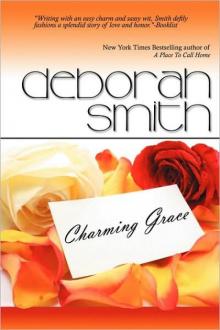 Charming Grace
Charming Grace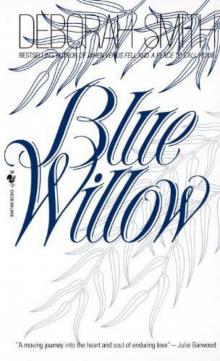 Blue Willow
Blue Willow The Pickle Queen: A Crossroads Café Novella
The Pickle Queen: A Crossroads Café Novella On Bear Mountain
On Bear Mountain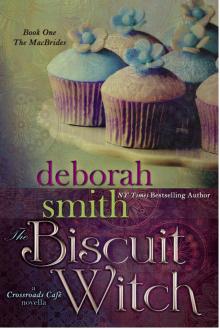 The Biscuit Witch
The Biscuit Witch Sara's Surprise
Sara's Surprise More Sweet Tea
More Sweet Tea The Apple Pie Knights
The Apple Pie Knights The Silver Fox and the Red-Hot Dove
The Silver Fox and the Red-Hot Dove Sweet Hush
Sweet Hush California Royale
California Royale Hot Touch
Hot Touch Miracle
Miracle The Stone Flower Garden
The Stone Flower Garden A Place to Call Home
A Place to Call Home Silk and Stone
Silk and Stone Honey and Smoke
Honey and Smoke Jed's Sweet Revenge
Jed's Sweet Revenge Silver Fox and Red Hot Dove
Silver Fox and Red Hot Dove The Kitchen Charmer
The Kitchen Charmer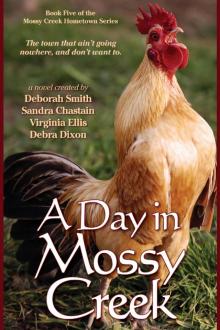 A Day in Mossy Creek
A Day in Mossy Creek Never Let Go
Never Let Go Summer in Mossy Creek
Summer in Mossy Creek On Grandma's Porch
On Grandma's Porch The Crossroads Cafe
The Crossroads Cafe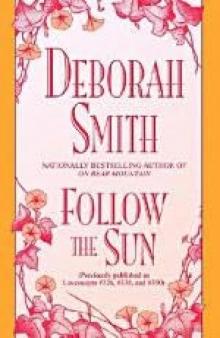 Follow the Sun
Follow the Sun The Yarn Spinner
The Yarn Spinner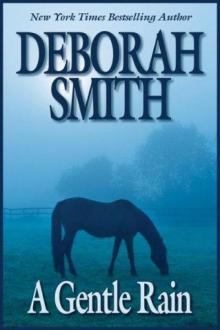 A Gentle Rain
A Gentle Rain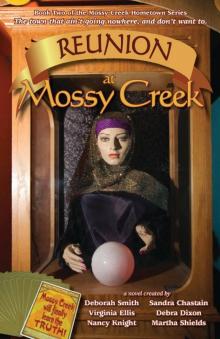 Reunion at Mossy Creek
Reunion at Mossy Creek